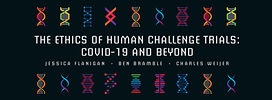Part of my argument in favor of permitting challenge trials is that permitting challenge trials today could prompt public officials and ethics boards to develop protocols and institutions that make it easier for researchers to conduct challenge trials in the future. But Ben Bramble argues that permitting challenge trials would undermine pandemic preparedness going forward. On Bramble’s view, officials should prohibit challenge trials “out of the need to ensure that in future times we do not take the easy way out” by permitting a small number of people to volunteer rather than requiring a large number of people to make easy sacrifices like mask wearing and physical distancing.
Bramble writes,
By letting effective altruists volunteer [for challenge trials] we are still allowing some people to endanger themselves because we have failed to protect our citizens. This is bad for these incredibly noble volunteers, who would increase their risk of serious illness, but it is also extremely bad for the rest of us, as it lets us off the hook for not taking actions we should have taken. This encourages moral complacency and makes it more likely that in future crises we will again fail to take important steps to avoid catastrophe.
Bramble acknowledges that challenge trials may be justified if they were necessary for vaccine development in the context of effective lockdowns, testing, and contact tracing. In these circumstances, a large number of people would have borne relatively unburdensome costs for the sake of reducing Covid transmission. Yet reduced transmission would make conventional vaccine testing difficult, so challenge trials would not be a consequence of a failed policy response but rather a consequence of a successful policy response.
I’d be interested in hearing more about why Bramble thinks it is valuable for citizens and public officials to not let themselves off the hook by permitting challenge trials. Bramble argues that permitting essential workers to put themselves at work is permissible because “there is no alternative” but to unevenly distribute these costs of addressing the pandemic. In contrast, Bramble suggests that the costs of vaccine development can be distributed more equitably so that people do not let themselves off the hook.
Bramble seems to deny the possibility that challenge trials can coexist alongside other effective public health interventions as part of an effective long-term pandemic response strategy, and that this is a problem for challenge trials. I’m skeptical that public officials must choose between challenge trials and effectively implementing other public health policies, but say we grant for the sake of argument that Bramble is right that conducting challenge trials would damage the “moral fabric” of society by letting people off the hook in this way. And let’s also grant, for the sake of argument, Bramble’s empirical assumption that permitting challenge trials would somehow cause a shift in public attitudes that would then make it less likely that people would wear masks, social distance, and comply with lockdowns.
Even if these claims were true, it would not follow that officials should prohibit challenge trials. This is because challenge trials could have other benefits, despite these costs. For one thing, if challenge trials could have accelerated the pace of vaccine development, or if permitting challenge trials today could make it easier to develop vaccines tomorrow, then the value of saving lives through faster development could outweigh the value of collectively distributing costs.
And to Bramble’s empirical point, even if it were true that permitting challenge trials discouraged mask wearing and physical distancing, faster development could nevertheless save lives relative to effective enforcement of these other policies. Additionally, even though physical distancing and masks could reduce Covid transmission in a way that doesn’t let people “off the hook,” there are costs to this approach as well. For example, enforcement is also morally risky. Even if such polices can be justified in principle, in practice there are no guarantees that public officials will effectively, fairly, and equitably enforce lockdowns or mask mandates. This is not to say that public officials are never justified in enforcing these policies, but it’s worth considering the moral risks and costs of Bramble’s proposed policies as well.
I also wondered why Bramble’s arguments wouldn’t apply to the standard approach to vaccine development as well. After all, though larger clinical trials include more participants than a challenge trial, they include a relatively small number of citizens, and they still expose participants to some risk. And in both cases, trial participants voluntarily take risks in ways that provide a public good and mitigate the need for shared sacrifice.
To close, I would also like to return to my earlier argument about the moral significance of consent. On my view, public officials should adopt a presumption in favor of permitting people to make voluntary decisions about their own bodies, as long as those decisions don’t violate others’ rights. Challenge trials are voluntary decisions that do not violate others’ rights, so officials should adopt a presumption in favor of allowing challenge trials. On Bramble’s view, where does this argument go wrong? Does Bramble’s position require rejecting a presumption against interfering with matters of bodily autonomy, or does Bramble think that challenge trial participants endanger others’ rights?
I look forward to continuing the conversation on this topic, and I am thankful for Prof. Bramble’s thoughtful engagement with the case for challenge trials.

